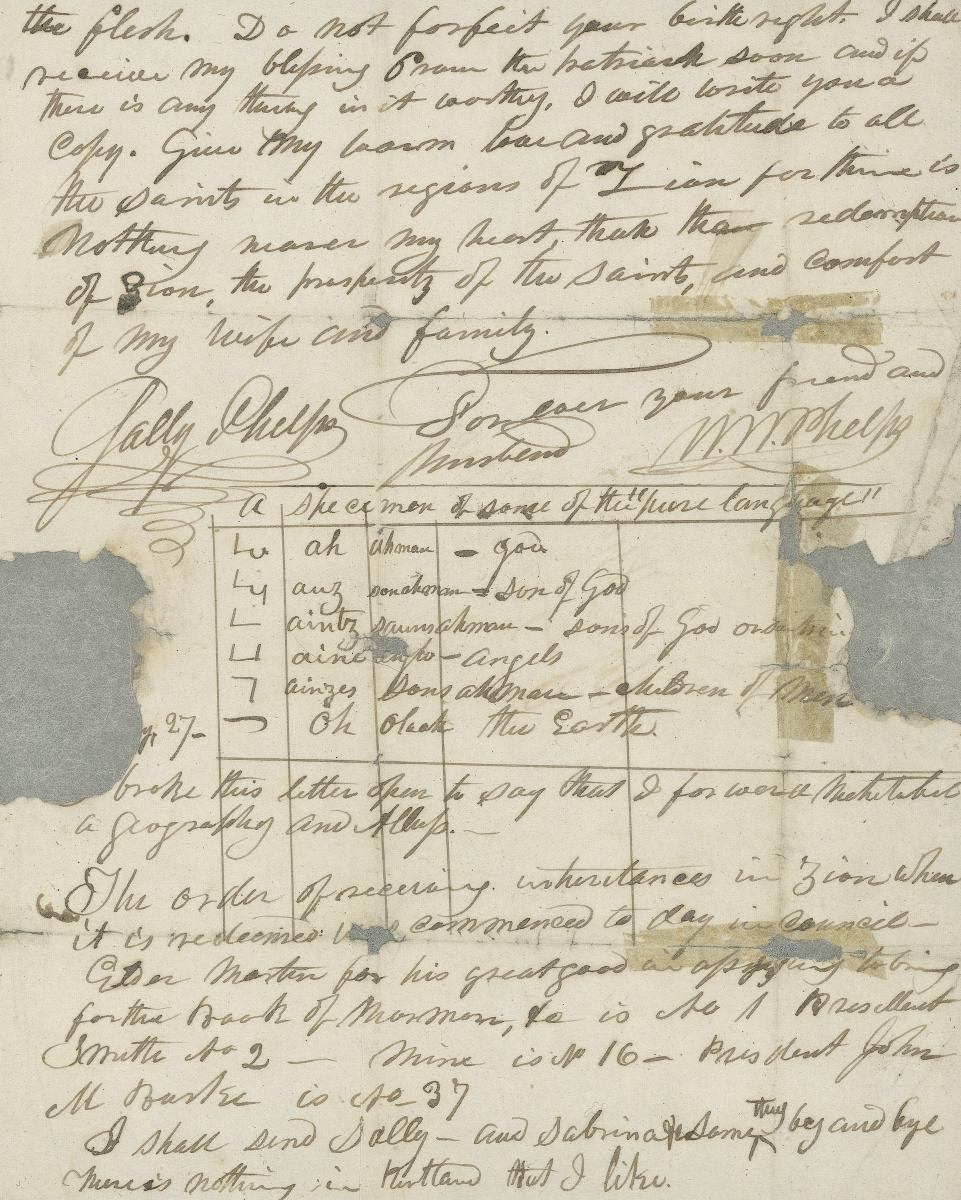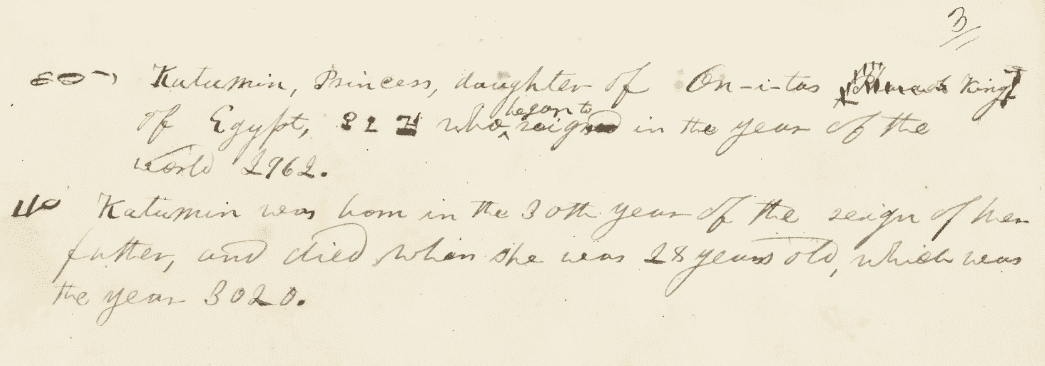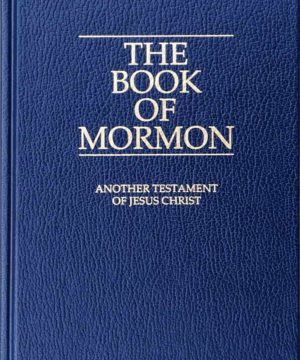In my previous post, “The Smoking Gun for Joseph’s Translation of the Book of Abraham, or Copied Manuscripts from an Existing Translation?,” I suggested that examination of the “smoking guns” for Joseph’s alleged “translation” process in creating the Book of Abraham actually don’t reflect an author creating and dictating a revealed text, but appear to reflect two scribes seeking to make a copy of an existing document. The process began orally, with somebody, possibly one of the scribes, reading an existing text out loud as both scribes then copied what was read. Then Warren Parrish quit writing at and that point, the manuscript by Frederick G. Williams shows that his copying process probably became based on looking and writing rather than listening and writing, evidence by an accidental repeat of three verses of text. If Williams were reading the text for Parrish’s benefit, or if a third party were reading it for both of the scribes, when Parrish left, there would be no need to keep reading, and Williams could simply copy the text directly by hand.
If Williams were the speaker, as I proposed, and had the text before him, he would have had the benefit of seeing how unusual names were spelled, and thus would be less likely to introduce misspellings that needed correction when it came to proper names. So let’s look at the typos in proper names in these two manuscripts and see how they compare. I awoke with this idea and did not know what the results of the inquiry would be as I wrote the above text. So let’s see how my hypothesis holds up.
Here are the proper names in each manuscript, excluding Egypt and Egyptian, Ham, Adam, and Noah. They are shown in order and grouped by name in order of occurrence and showing corrections:
The transcript of Manuscript A by Frederick G. Williams has these proper names, shown in order of occurrence but grouped by name, with corrections shown:
- Elk=Kener, Elk=Kener, Elk=Keenah, Elk-keenah, Elk Kee-nah, Elk-Keenah, Elkkeenah
- Zibnah, Zibnah, Zibnah
- Mah-mackrah, Mah-Mach-rah, Mah-Mach-rah
- Pharoah, Pharaoh, Pharaoh, pharaoh, Pharaoh, Pharaoh, Pharaoh, Pharaoh, Pharaohs
- Chaldea, Chaldea, Chaldeea, Chaldea, Chaldea, chaldees, chaldees, chaldees
- Chaldeans, Chaldians, Chaldea [“in the Chaldea signifies Egypt” – Chaldean is meant]
- Shag=reel, Shag-reel
- Potipher<s> hill, Potiphers hill
- Olishem
- Onitus Onitah
- Kah-lee-nos [note that the canonized text has Rahleenos]
- Abram, Abram, Abraham <Abram>, Abram, Abram, Abram
- Ur, Ur, Ur, Ur, Ur
- Cananitess, cannites
- Zep-tah
- Egyptes
- Haran, Haron, Haran, Haran, Haran, Haran, Haran
- Terah
- Sarai, Sarai, sarah
- Nahor
- Milcah
- canaan, canaan
- Lot
Manuscript B by Warren Parrish has these proper names showing corrections, as displayed in the transcript at the Joseph Smith Papers site:
- Elkkener, Elkken[er][here the edge of the paper is damaged obscuring the final r, but it appears that he wrote the full word, Elkkener], Elkkener, Elkkener, Elkkener, Elkkener
- Zibnah, Zibnah, Zibnah
- mahmachrah, Mahmachrah, Mahmachrah
- Pharoah, Pharao[h], Pharaoh, Pharaoh, Pharoaoh, Pharaoh, Pharaoh, Pharaoh, Pharaoh, Pharaoh, Pharaoh
- Chaldea, Chaldea, Chaldea, Chaldea, Chaldea, Chaldeas
- Chaldeans, Chaldeans, Chaldea [“in the Chaldea signifies Egypt” – Chaldean is meant, same error here as in Manuscript A],
- Shagreel, Shagreel
- Potiphers hill, Potiphers hill
- Olishem
- Onitah
- Kahleenos [The canonized text has “Rahleenos.” Since a cursive capital R often looks much like a K, it would be easy to read “Rahleenos” on an existing text as “Kahleenos.” Williams also wrote “Kahleenos.” Perhaps the original text had Kahleenos, or it may have had “Rahleenos” which Parrish or someone else misread.]
- Abram, Abram, Abram
- ur, Ur, Ur
- canaanites, Canaanites
- Zeptah
- Egyptes
- Haran, Haran
- Terah
- Sarai
- Nahor
- Milcah
Parrish is not a great speller, giving us “preist,” “sacrafice,” “fassion” (fashion), “patraarch,” “govermnent,” “pople” (people), “Idolitry,” “deliniate,” “runing,” and “smiten,” but he spells names consistently, with the exception of capitalization and one typo for Pharaoh. Williams, on the other hand, has significant variation in his spelling of unusual words, suggesting that he was writing down what he heard for the most part, while Parrish might have been looking at what he was writing or was able to see it when needed if someone else were dictating, so his unusual words are spelled accurately and consistently.
Based on the data, it seems unlikely that Williams was reading the text, but much more likely that Parrish was, or that he could at least see the text when needed to see how unusual names were spelled. My original hypothesis (Frederick G. Williams as a possible reader) is overturned.
Update, April 19, 2019: When Warren Parrish wrote the third Book of Abraham Manuscript, Manuscript C, the transcript at the Joseph Smith Papers says he wrote “Rahleenos.” I think this is a mistake. It certainly looks like Rahleenos at first glance, but in the same verse, the way Parrish writes “K” in “King” is identical to the letter that is followed by “ahleenos.” In other words, it’s clear that he also wrote Kahleenos. There are no capital Rs in that document to see how he would have written Rahleenos, but you can see many capital Rs in other documents such as his “Minutes, 3 September 1837” at the Joseph Smith Papers site. His capital R is much different than his capital K. Is our current “Rahleenos” an error or does it reflect what was on or should have been on the original but missing document from Joseph’s translation of the Book of Abraham? When Rahleenos appears again in an 1842 manuscript from Willard Richards, that “R” looks an awful lot like the “K” in the word “King” shortly before it, but there is an touch of extra ink in that “K” that distinguishes the two. He joined the Church too late to be involved in the early Book of Abraham work, but it shows that in handwriting of that era, it was possible for a “K” and an “R” to look quite similar. Curious to know what Joseph originally dictated.
This post is part of a recent series on the Book of Abraham, inspired by a frustrating presentation from the Maxwell Institute. Here are the related posts:
- “Friendly Fire from BYU: Opening Old Book of Abraham Wounds Without the First Aid,” March 14, 2019
- “My Uninspired “Translation” of the Missing Scroll/Script from the Hauglid-Jensen Presentation,” March 19, 2019
- “Do the Kirtland Egyptian Papers Prove the Book of Abraham Was Translated from a Handful of Characters? See for Yourself!,” April 7, 2019
- “Puzzling Content in the Egyptian Alphabet and Grammar,” April 14, 2019
- “The Smoking Gun for Joseph’s Translation of the Book of Abraham, or Copied Manuscripts from an Existing Translation?,” April 14, 2019
- “My Hypothesis Overturned: What Typos May Tell Us About the Book of Abraham,” April 16, 2019
- “The Pure Language Project,” April 18, 2019
- “Did Joseph’s Scribes Think He Translated Paragraphs of Text from a Single Egyptian Character? A View from W.W. Phelps,” April 20, 2019
- “Wrong Again, In Part! How I Misunderstood the Plainly Visible Evidence on the W.W. Phelps Letter with Egyptian ‘Translation’,” April 22, 2019
- “Joseph Smith and Champollion: Could He Have Known of the Phonetic Nature of Egyptian Before He Began Translating the Book of Abraham?,” April 27, 2019
- “Digging into the Phelps ‘Translation’ of Egyptian: Textual Evidence That Phelps Recognized That Three Lines of Egyptian Yielded About Four Lines of English,” April 29, 2019
- “Two Important, Even Troubling, Clues About Dating from W.W. Phelps’ Notebook with Egyptian “Translation”,” April 29, 2019
- “Moses Stuart or Joshua Seixas? Exploring the Influence of Hebrew Study on the Grammar and Alphabet of the Egyptian Language,” May 9, 2019
- “Egyptomania and Ohio: Thoughts on a Lecture from Terryl Givens and a Questionable Statement in the Joseph Smith Papers, Vol. 4,” May 13, 2019
- “More on the Impact of Hebrew Study on the Kirtland Egyptian Papers: Hurwitz and Some Curiosities in the GAEL,” May 20, 2019
- “He Whose Name Cannot Be Spoken: Hugh Nibley,” May 27, 2019
- “More Connections Between the Kirtland Egyptian Papers and Prior Documents,” May 31, 2019
- “Update on Inspiration for W.W. Phelps’ Use of an Archaic Hebrew Letter Beth for #2 in the Egyptian Counting Document,” June 16, 2019
- “The New Hauglid and Jensen Podcast from the Maxwell Institute: A Window into the Personal Views of the Editors of the JSP Volume on the Book of Abraham,” July 1, 2019
- “The Twin Book of Abraham Manuscripts: Do They Reflect Live Translation Produced by Joseph Smith, or Were They Copied From an Existing Document?,” July 4, 2019
- “Kirtland’s Rosetta Stone? The Importance of Word Order in the ‘Egyptian’ of the Grammar and Alphabet of the Egyptian Language,” July 18, 2019
- “The Twin BOA Manuscripts: A Window into Creation of the Grammar and Alphabet of the Egyptian Language?,” July 21, 2019
- “A Few Reasons Why Hugh Nibley Is Still Relevant for Book of Abraham Scholarship,” July 25, 2019












I don’t understand. What does it matter? If we have already admitted that we are blessed to admit that it does not matter if Abraham wrote some original document or not, then what does it matter? If we are blessed to admit that it is the principles of the Book of Abraham that are true regardless if the story is all made up, either intentionally or accidentally made up, then why are we wasting time discussing it further, instead of spending that time striving to live the principles?
If this doesn't matter, there's no need to read or comment, but thanks for the comment anyway.
Who wrote the original document may not be not critical, but the issue is whether Joseph was just making up crazy stuff when he thought he was translating. Does it matter to you whether Joseph made up the Book of Mormon? Does the fact that it has some nice principles make its origins irrelevant?
The attacks on the Book of Abraham are used by critics to lead people away from faith, and they way they do it relies on arguments that deserve a response, because there is no need to abandon faith over confusion about the Book of Abraham. For those who care, it matters. If Joseph's inspiration and ability to translate by divine power are of no interest to you, then I also suspect that you aren't getting the full richness that those texts can bring, especially when understood in light of their ancient settings.
Their ancient roots and divinity matters to many of us, though the details of their productions may not be critical. I have no problem with the Book of Abraham being an ancient document synthesized from a variety of sources, but if Joseph were just doing a "chicken soup for the gullible soul" project, I feel that's a problem.
So it does matter? You are saying if the bulk of the evidence shows Joseph was making stuff up with out knowing it then you are required abandon faith the same way Mormons try to get Christians to abandon their faith? And abandoning that faith is a bad thing and not a blessing? Just the other day you were saying what a blessing it is to abandon the faith that the lamanites are the principle ancestors of the native Americans. Now abandoning faith is a bad thing? Who can understand you. One day things matter, the next day they don't. One day something is a blessing the next day it is not. Whishy washy.
No explanation? Well then, we see you are the one with all the contradictions. Something matters and then doesn't matter, abandoning faith is a good thing and then it is a bad thing, all on your whim. You elevated your self as some sort of self-declared prophet that decides who is and is not getting the full richness of scripture. You have clearly never been here to engage in genuine dialogue. You are only here to build an altar to yourself and stroke your own ego with your own imagination and verbosity.
"if the bulk of the evidence shows Joseph was making stuff up"
But the bulk of the evidence does show this. I have met many Mormons that say "so what", after all the Church is charitable, etc. Here Jeff is arguing the fact the Church teaches kindness or charity is not enough, Mormons must abandon their faith. I will point out to all those Mormons I meet that say "so what", to Jeff here. Here Jeff is defending the ex-Mormons as the ones doing the truly moral thing. According to Jeff it matters, and if you care about right and wrong you should be an ex-Mormon. But don't abandon your kindness and charity with those immoral Mormons.
You will appreciate my husband's study of the Book of Abraham. He, too, noticed that the R in Rahleenos looks like the K in Kings, and that led him to linguitic phonemes that allowed him to decipher the meaning. He also made sense of the GAEL in a way I haven't seen with most scholarly writing. Scroll down to the section on the Book of Abraham to see his findings. https://thelunchisfree.com